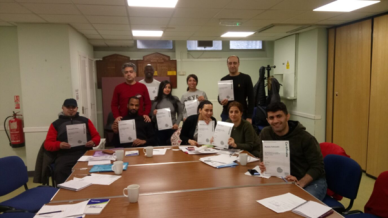Our popular Creative Writing workshops and courses are facilitated by a range of writers who can create the right course for your group. We have worked with a range of partners including trade unions, Scottish prison services, local voluntary organisations including Sunny Govan, the NHS, Platform and many more. Read more below, and if you need more information, reach out via the 'Contact Us' form below.
Through working on their own stories, poems, plays and creative non-fiction pieces, learners build confidence and pleasure in telling stories and communicating what they want to communicate in the way they want to communicate it. Sessions are relaxed and fun, but embedded literacy skills include:
Grammar
As Stephen King said, “Grammar is…the pole you grab to get your thoughts up on their feet and walking”. WEA Tutors favour a rhetorical grammar approach, focusing on how grammatical forms might contribute to the intended meaning of their writing. This approach helps learners to become aware of grammar and syntax as what Salvatore calls “a set of tools, rather than a set of rules.” We also look at grammar by listening to the rhythms of our character’s voices and figuring out how to get that down on the page.
Spelling and Vocabulary
How do you spell words the way that you say them? Can you use words in stories that are not in the dictionary? What’s an apologetic apostrophe? What vocabulary did your grandparents use that is no longer popular? What words do your children use that are new to you? How might exploring the vocabulary, voices and rhythms around us shape how we write?
Critical thinking
Groups read and discuss texts by writers from around the world, including James Kelman, Muriel Rukeyser, Janice Galloway, Tillie Olsen, Bhanu Kapil, Aurora Levins Morales and Anne Boyer. Participants read and discuss each other’s writing, as well as sharing favourite poems, short stories, plays, television programmes and films.
Public Speaking/self-confidence
Participants learn new ways of reading their work aloud, building the skills and confidence to speak in their own voice.
Page layout
Can we come to the blank page as a writer comes to a blank canvas? Think of the shape of Tom Leonard’s poems or rhythm in the work of James Kelman. Writers are encouraged to move their text about on the page, to draft and redraft, to play, listen and find ways of representing, recreating or reinventing the world around them on the page.
Visual Journalling
Learn about the benefits of visual journaling! This visual journalling course will introduce different techniques to create a visual journal and introduce mark making, collage and experimental drawing. Absolutely no experience is necessary, and neither are art supplies as learners can use materials from around their home. Sessions can focus on the benefits of journalling; materials and mark making; drawing techniques and creative prompts; collage and scrapbooking; found poems and visual words.
Journalling for Well-being
Journalling can be as simple as taking 5 minutes each day (or as often as you can) to note down thoughts and feelings. There are many techniques learners can use to get the most out of journalling to help improve well-being. Our courses incorporate exercises and tools that can help keep journalling practice fresh and creative. An example of topics covered in our Journalling for Well-being courses include types of journals; automatic writing; chronicling; unsent letters; safe journalling; and safe sharing.
Where do these groups take place?
In-person workshops and courses of all shapes and sizes, online, at a venue of your choice, indoors or outside – it's up to you!
SQA Core Skills Awards
We are an SQA-approved centre and can embed SQA Core Skills awards in Communication and/or ICT in our creative writing programmes.
What do our learners say:
“Helped me read, write and enjoy poetry—excellent experience”
“Amazing experience learning and exploring poetry, connecting with nature and the world around me, learning about Renga Poetry and enjoying writing”
“I really enjoyed writing poetry in a group setting with a tutor who made the experience interesting and broke down barriers”
“Enjoyable and sociable. Just being part of a group of learners/friends was great.”
“I really liked meeting new people and the sessions were really open”
Want to learn more? Can we help you?
Complete the form below and one of our friendly team will be back in touch!









